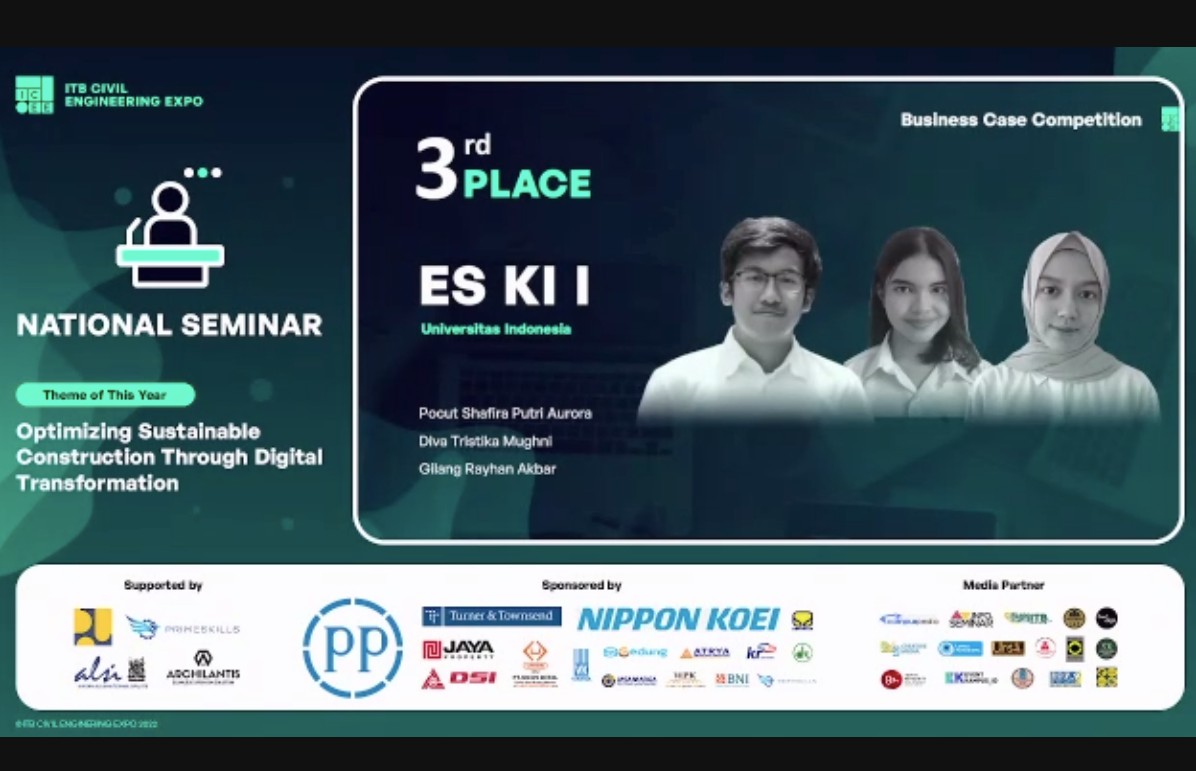Three students of the 2019 Industrial Engineering Department, Faculty of Engineering Universitas Indonesia, Pocut Shafira Putri Aurora, Gilang Rayhan Akbar, and Diva Tristika Mughni won Third Place in ITB Civil Engineering Expo’s (ICEE) Business Case Competition 2022. The National Business Case Competition was held on January 4–30 2022 with 12 teams from various campuses in Indonesia participated. Sustainability Construction is the theme for this year’s competition.
Pocut and the team who are members of the ES KI I Team prepared a proposal entitled “#ICEECHAIN Integrated Strategy as a Sustainable Cement Factory Solution at PT ICEE”. PT Innova Cement Evergreen (ICEE) is a cement company in Indonesia that is planning an environmentally friendly policy for the construction of its factory in East Kalimantan. Unlike most other cement plants, PT ICEE does not want to emit more than 725.7 kilograms of CO2 per ton of cement. Therefore, the ES KI I Team formulated a sustainability strategy in terms of materials, technology, production, to the supply chain called #ICEEChain.
“The strategy we have designed includes the use of environmentally friendly materials (biomass and waste fuels and the use of alternative cement raw materials), adaptation of Kiln Analytics technology and the use of solar panels as electricity supply, as well as logistical plans for the supply chain with operational centers in Banjarmasin,” said Pocut, Head of ES KI I.
The first strategy is the use of alternative fuels, biomass and waste treatment. By using processed waste and biomass to replace fossil fuels, PT ICEE can reduce emissions by up to 10% by 2050. In order to use alternative biomass fuels for heating kilns, PT ICEE needs to determine a location not far from where the main biomass raw materials are available such as oil palm plantations, energy plantations, water potential in upstream rivers.
“The cement production process that produces the largest carbon dioxide emission is the kiln process or the combustion process, which is 51.8% of the total emissions or 497 kilograms per ton of cement. Therefore, it is necessary to find a way to reduce emissions from the use of kilns. The ES KI I team recommends the use of an analytics kiln. With this strategy, the material costs incurred will decrease because the fire does not immediately burn all the materials given, but burns according to the level of the materials provided, “said Diva Tristika Mughni.
The final strategy this team offers is supply chain implementation. PT ICEE by opening a factory and operational center located in the Banjarmasin area. The mode of transportation that will be used is via trucks and ships. The supply chain of cement products starts from factories, silos for packing and preprocessing, warehousing at distribution centers, to retailers.
“By implementing the #ICEEChain that we designed, PT ICEE will reduce CO2 emissions by 20%, save fuel by up to 12% and the amount of materials up to 3%, and reduce electricity costs by up to 27%. Feasibility analysis shows that our project is feasible to carry out with an IRR of 12.24% and an NPV of Rp. 1,238,889,855.842,” said Gilang Rayhan Akbar.
Met on a separate occasion, the Dean of FTUI, Prof. Dr. Heri Hermansyah, S.T., M.Eng., IPU. expressed his appreciation for the achievements of the three students. “Hopefully what these three students produce can contribute to business feasibility studies and studies in designing sustainable factories in the scope of financial models, technical, problem analysis, to formulating solutions including how to apply them and risk management and can be utilized by the industrial world in the future.”
***
Public Communication Bureau
Faculty of Engineering, Universitas Indonesia

